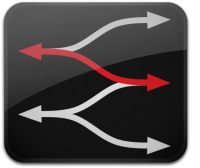libmapper 0.3 released
In addition to many improvements and bugfixes, libmapper v0.3 includes several major new features:
- Time: libmapper now supports timetagging every signal update. With this we include the ability to bundle several signal updates together using “queues” which defer sending of updates. We also add an optional
rateproperty to signals which can be used to represent regularly-sampled signals. This means that it is possible to support “blocks” of data where each sample does not have the overhead of an individual message header. The default behaviour, however, is still to send each signal update as an individual, time-stamped OSC message, assuming irregular updates. Software sampling sensors should be aware of how to distinguish between regularly- and irregularly-sampled signals and use the correct behaviour accordingly. At low sample rates, of course, the difference is not as important.
- Instances: libmapper now supports the concept of mapping multiple “instances” of a signal over a single connection. This can be used for supporting interaction with multi-touch devices as well as for polyphonic musical instruments. A sophisticated “ID map” between instances created on a sender and instantiated on the receiver is automatically maintained, allowing the synchronization of behaviours between the two connection endpoints. Allocation of (possibly limited) resources to individual instances can be managed by a callback, which is called when new instances are created and old instances are destroyed. A complete treatment of this topic is not possible here, but will be documented in a forthcoming paper.
- Reverse connections: A connection mode called
MO_REVERSEhas been added which can be used to establish signal from from output to input. The intention is to use this for training machine learning systems, allowing the construction of so-called example-based “implicit mapping” scenarios.MO_REVERSEof course does not invert the mapping expression, so is best-used for direct connections to an intermediate device that sits between a data source and destination. Single “snapshots” of output state can also be acquired by a query system, usingmsig_query_remotes().
- Compatibility with select(): It is now possible to get a list of file descriptors that libmapper reads from. This can be used as arguments to
select()orpoll()in a program that uses libmapper among other sockets or files to read from.
- Local link/connection callbacks: Programs using libmapper can now know when a local device has been linked or connected by registering a callback for these events. Although it is not encouraged at this time, this can be used for example to implement data transport over alternative protocols, using libmapper only for determining the destination IP and agreeing on the connection details. In the future we plan to add support for alternative protocols within the libmapper framework, so that mapping expressions can still be used even when alternatives to OSC are used to send and receive data.
- Null values: An important change that users should be aware of is that the signal callback (whose signature has changed) can now be called with the
valuepointer being zero. This indicates that the mapper signal is actually non-existant, i.e. no value is associated with the signal. That is to say that “null” is now considered a valid state for a signal and is different from, for example, a value of zero. User code can choose to ignore this case or to make use of it if there is a semantically relevant action to take. An example of this condition is if some signal does not have a valid value when some other signal is in a certain state, or for reverse connections, a null value might indicate that the output has not been set to anything yet. Local code can query the last-updated value of any signal using themsig_value()function.
The tutorial has also been translated for several supported language bindings: Python, and Max/MSP. Build documentation has also been added.

